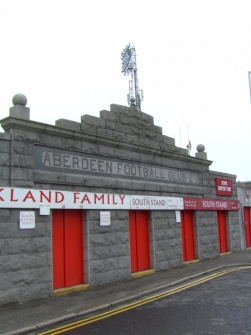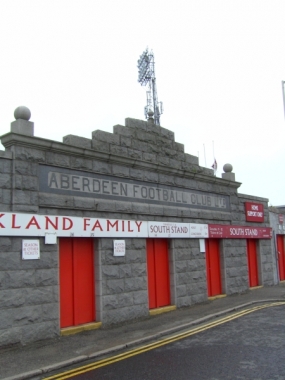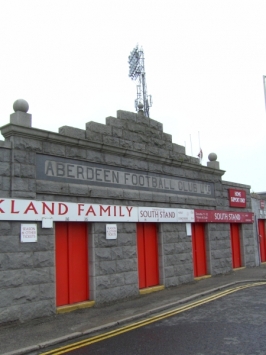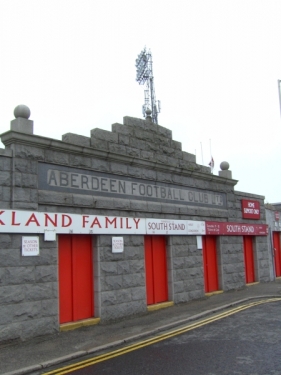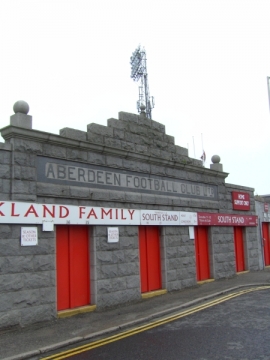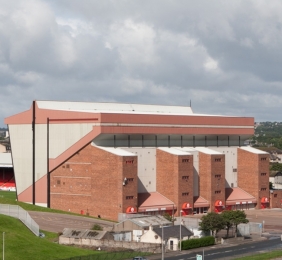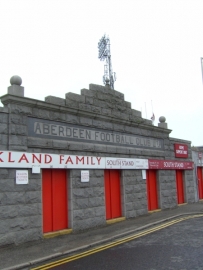Last week’s debacle at Easter Road raised the question of whether Aberdeen and Hibs were bottom of the league because they were playing badly, or if they were playing badly because they were bottom of the league. The question might be answered in that this weekend, against teams in the top six, both sides played out highly entertaining 2-2 draws. Philip Sim reports from Pittodrie.
The Dons might justifiably feel they should have won their match with Kilmarnock, but the fact they trailed 2-0 after half an hour will leave the Red Army more positive about the result.
Aberdeen dictated much of the proceedings, winning a string of corners and creating chances early on, but despite the home side’s dominance it was the visitors who took an advantage into the interval by scoring with their only two attempts of the half.
The Dons showed resilience to come back from two goals down, and pressed hard to find a winner in the closing stages.
At the outset, many of last week’s questionable tactics remained in place – Kari Arnason, the most composed player in Aberdeen’s overstaffed central midfield, was again deployed needlessly at centre back, pushing Andrew Considine out to left back. Another midfielder, Ryan Jack, featured at right-back, while full-back Ricky Foster was played on the left wing. The other wide position was filled by central midfielder Fraser Fyvie.
Jack and Arnason are convincing near enough wherever they play, but Fyvie is not a winger, nor is Considine a full-back. And what is there to gain by pushing Foster forward into midfield? He looks fine bombing forward to the byline to get a cross in, but when he cuts inside he looks rather lost and confused. All of the good things he does from left midfield he was doing anyway from left-back, as well as using his pace to cover the defence. Moving him into midfield only serves to shuffle other players around to compensate.
Despite being played out of position, big Andrew Considine played out of his skin. While he still displays all the characteristics of a centre half – strong physically on or off the ball, good in the air – he also showed great attacking intent, thundering forward at every opportunity and whipping in some excellent crosses.
His goal was brilliantly taken, especially given it was with his weaker right foot, a finish that few of the Dons front line could have conjured in the current drought.
That said, the Dons featured an all-new strike pairing against Killie, with Rory Fallon and Mohamed Chalali both handed their first start in a red shirt.
Chalali showed good intent with some direct running at the visitor’s defence, and while Fallon won everything in the air the pair didn’t quite click as a partnership. Too often the Algerian directed his runs the wrong way to meet the Kiwi’s flicks, and after being moved out to the wing it was little surprise when Chalali was hooked at half time for the ultimately equally ineffective Peter Pawlett.
Fallon looked the part as a traditional target man, something the Dons have lacked this season, and almost gave his side the lead with a second-half header which rebounded back off the crossbar. This came after he was ludicrously booked in the first half by referee Iain Brines, supposedly for simulation – while the challenge in question may not have merited a penalty award, it certainly wasn’t a dive.
Brines gave Fallon absolutely nothing all afternoon, leading some to speculate that the whistler’s wife may have run off with a Kiwi.
In a way Craig Brown should thank Brines for his blunder, as that was the turning point in the match – after the second Killie goal, the heads had gone down, and it was only after the penalty controversy that the Dons looked fired up and hungry for vengeance.
Aside from the defensive lapses for the goals – one a missed header by Youl Mawene, who made amends by heading the equaliser, the other an instance of the entire midfield going to sleep at once – the main disappointment for Aberdeen was the attendance, a paltry seven and a half thousand. Although perhaps thanks to the quality of the match and the questionable officiating, the crowd produced one of the best atmospheres Pittodrie has seen this season.
The dwindling gates might have more to do with the accumulated horrors of the last couple of seasons than Aberdeen’s performances this term, but Brown‘s side could get the numbers heading in the right direction with a couple of wins.
Hopefully a good performance against lowly East Fife in the cup next week will generate some interest in the next home match, an experimental Friday night encounter with Dunfermline, and get the faithful flocking back to Pittodrie.
